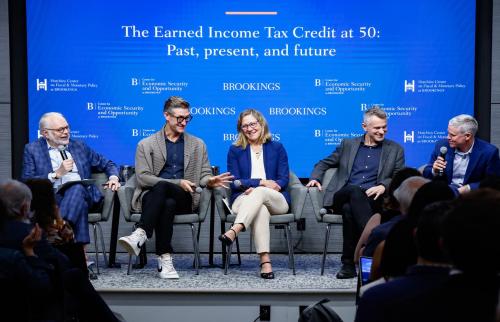This is a preview of a proposal published here in October 2024.
America is the only high-income country that does not guarantee workers paid time off as part of national workplace standards. While the United States has become embroiled in debates about specific kinds of paid leave—paid parental leave, paid sick leave, paid short-term disability leave—there has been little discussion of the fact that all workers would benefit from being able to earn and use a paid day off to meet their various needs.
The Fair Labor Standards Act (FLSA) was conceived nearly a century ago and rightly focused on the needs of workers at the time: workplace safety, a minimum wage for the lowest paid workers, and overtime pay to help establish the 40-hour work week. Since its passage, U.S. GDP per capita has risen to over $80,000 a year, a roughly seven-fold improvement in real income. And yet, despite this surge in living standards neither the definition of a fair workplace nor the rights of workers has substantially changed.
In a modern, wealthy economy, workers need to be able to take time off for illness, family, rest, recovery, and personal needs. This need is glaringly absent from the FLSA because it was not a pressing issue of the early 20th century. In the decade that it was conceived and passed into law, the typical American could only expect to live to around age 60 and much of modern day health care had yet to be invented. Today’s workers can expect to live decades longer, particularly if they look after their physical and mental health. The FLSA updated for the 21st century should ensure that workers are fairly able to earn and access paid time off.
A forthcoming policy proposal to be published by The Hamilton Project at Brookings will explore a modernization of the FLSA that would set a new baseline for the American labor market: the 40-hour workweek, overtime protections, the federal minimum wage, and the right to earn paid time off for all qualified workers.
By putting forward “earned time off” as a natural extension of the FLSA, the U.S. can continue its tradition of labor rights advancement, offering protections and benefits that reflect the needs and complexities of modern employment. And it can better align U.S. workplace rules with those of other advanced economies, all of which mandate some form of paid leave for workers as part of a fair workplace.
In a modern, wealthy economy, workers need to be able to take time off for illness, family, rest, recovery, and personal needs.
The state of paid time off
Today, only some workers have the benefit of being paid when they take time off work. Current access to paid leave depends on where you live: Fifteen states plus the District of Columbia have earned paid sick leave requirements, and 13 states plus the District of Columbia have some form of paid family and medical leave.
What have we learned from these paid leave expansions? In short, paid time off increases productivity and labor force participation, both of which benefit employers and are critical for economic growth. Tying leave directly to hours worked ensures that paid leave has negligible costs to employers because each hour of paid leave is earned through dozens of hours of hard work. For example, in Massachusetts one must work 240 hours to earn one eight-hour paid day off.
Surveys of employers following the adoption of state paid sick day laws show little cost to employers. Earned sick leave carves out a small amount of a worker’s hourly compensation for the future. It acts as a form of forced saving for workers, ensuring that they can take time off without losing critical income. For example, a policy that allows workers to earn one hour of paid time off for every 40 hours they work is effectively setting aside 2.5 percent of their pay for a future date. While some of the incidence of this cost may initially fall on employers in the form of increased costs, the benefit ultimately becomes part of total compensation and is largely borne by workers in the form of lower hourly wage rates. Some workers may prefer to have higher wages and no access to paid time off. But people are generally better off when they are able to smooth their income over time even as their work effort is, by necessity, more volatile due to the volatility of health and energy.
Paid time off may also generate benefits which offset the costs, essentially making it a “win-win” for both employers and workers. Paid time off has been shown to reduce “presenteeism” (essentially taking time off while at work), which directly boosts productivity. Research also suggests an indirect link to productivity, as rest and rejuvenation can increase workers engagement at work following a vacation. In addition, when people have access to a paid sick day, workplace illness falls because contagion is reduced. Research has shown that state paid sick leave requirements led to declining occupational injuries and illnesses. Less contagion and fewer injuries and illnesses boost productivity more broadly in the workplace.
Who is left out of paid leave?
There are few paid leave mandates beyond the handful of states that require earned sick leave or other forms of leave. Workers living in states without paid leave mandates ultimately depend on their employer to offer paid leave as part of a compensation package. While unionized workers are much more likely to have access to paid leave, the decline in unionization has meant workers have less power to collectively bargain for the benefits they need.
So which workers do not have access to paid leave? Workers who live in a state or city that does not require paid leave or whose leave needs are not covered by state or city paid leave requirements do not have access to paid leave unless their employers voluntarily offer it. Roughly 60 percent of low-wage workers who take leave do not get paid compared to 20 percent of non-low-wage workers. Employees who work part time and gig workers and independent contractors are less likely than those working full-time for large corporations to have access to paid leave. An estimated 34 million workers, nearly 23 percent of the workforce in the U.S., do not have access to paid sick time off. Many more lack access to paid leave for mental or physical well-being, to care for a family member, to meet with a child’s teacher, or to deal with a household emergency.
Relegating workers to jobs without access to paid time off is not the norm for advanced economies. Australia’s National Employment Standards stipulate that all employees, except casual workers, are entitled to a minimum of four weeks of paid leave per year. The leave accumulates from the first day of employment and can be taken as soon as it is accrued. The European Union Working Time Directive outlines limits to working hours and overtime rules and requires all EU countries to ensure that workers get at least 20 days of paid annual leave. French law extends the EU directive and mandates a minimum of 30 working days of paid annual leave in which leave is accrued over a “reference period,” and all workers, regardless of their contract type, are entitled to it. In the United Kingdom, workers have the right to 28 days of leave, including public holidays. Employers can choose to have the leave accrue over time or give it as a fixed amount at the start of each year. These are policies regarding annual leave; most advanced economies also have policies ensuring that people have access to paid maternity, paternity, and sick leave.
Why earned time off?
By amending the FLSA, the federal government could ensure that people who put in enough working hours generate a certain amount of paid leave, called “earned time off.” “Earned time off” allows workers to control how they use the paid leave they earn. This would expand workers’ rights and acknowledge the human need to take time off from work without bearing the financial risk and hardship of a lower paycheck.
Earned time off is simple. It uses the time someone has spent working as the determinant of their eligibility and is only given after it has been earned. That flexibility and the connection to work already done makes it easy to design the benefit such that it could cover a wider range of people including part-time workers and independent contractors.
People who work as independent contractors could be covered under this policy because it is based on time worked. In Washington, for example, the state’s paid sick leave legislation covers ride-share drivers. That policy provides workers with an hour of paid leave for every 40 hours worked. This applies equally to ride-share workers: They accrue one hour of paid sick leave for every 40 hours spent driving passengers. Unlike unemployment benefits and minimum wage requirements, earned time off does not involve complicated questions about how much effort workers are putting in or who controls their hours.
By including all workers under FLSA, this means the program is universal: Everyone that meets the employment and hours worked thresholds would earn time off with pay. Paid time off would also be universal in terms of the uses of leave. Workers would control how they use this time off, meaning that they could use it for vacation, personal time, caregiving, or personal medical needs. In this framework, earned time off also respects the individuality of workers and their needs by allowing them to make the best decisions for themselves and their families.
Earned time off is simple. It uses the time someone has spent working as the determinant of their eligibility and is only given after it has been earned. That flexibility and the connection to work already done makes it easy to design the benefit such that it could cover a wider range of people including part-time workers and independent contractors.
Benefits to earned time off
By tying the benefit to work, an earned time leave policy will lead to higher labor force participation, benefit the economy, treat hours worked equally, and align the U.S. with globally competitive nations.
Earned time off encourages workers to stick with their job in order to earn a desired paid vacation rather than quitting when they need a break. Earned time off allows workers to take a break when they may be struggling with their mental or physical health, have family needs, or simply need a rest. In the absence of access to leave, too many workers end up quitting their jobs when a paid day off every now and then might be enough to ensure that they can manage their responsibilities outside of work. Studies have repeatedly shown that workers often leave the labor force due to their need for time off for short-term caregiving responsibilities (like an eldercare emergency) or for reasons relating to their own illnesses.
American workers want choice and control over their benefits. By allowing workers to choose how to use their earned time off, the policy trusts them to use paid time off wisely to take care of their needs and the needs of their family. While some employers were initially worried that workers would abuse paid sick leave policies, few employers have reported such an experience. Workers who have given hundreds of hours of hard work to their employer should be trusted to spend their earned time off in whatever way works best for themselves and their families.
-
Acknowledgements and disclosures
I would like to thank Lauren Bauer, Este Griffith, and Wendy Edelberg for working closely with me in developing this proposal, providing thoughtful comments, suggestions, and management. I would also like to thank Luke Schaefer and the team at Poverty Solutions for their insights, particularly Benny Doctor who provided data analysis and research support over the past year. Finally, I would like to thank the Robinhood Foundation for generous funding in 2022-23 that supported the development of ideas contained in this proposal.
Stevenson is a board member of Lyft, Inc. The author did not receive financial support from any firm or person for this article or from any firm or person with a financial or political interest in this article. Other than the aforementioned, the author is not currently an officer, director, or board member of any organization with a financial or political interest in this article.
The Brookings Institution is financed through the support of a diverse array of foundations, corporations, governments, individuals, as well as an endowment. A list of donors can be found in our annual reports published online here. The findings, interpretations, and conclusions in this report are solely those of its author(s) and are not influenced by any donation.
The Brookings Institution is committed to quality, independence, and impact.
We are supported by a diverse array of funders. In line with our values and policies, each Brookings publication represents the sole views of its author(s).







Commentary
All workers should be able to earn time off: The federal government should guarantee it
February 29, 2024
Key takeaways: